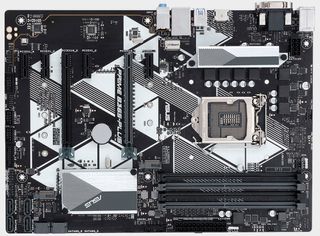Asus unveils a motherboard based on Intel’s largely ignored B365 chipset
Intel's B365 chipset offers a few advantages over the more commonly used B360 chipset.

Asus has added a new motherboard to its extensive lineup, the Prime B365-Plus, though this particular model is a bit of a rare breed. It's one of relatively small number of motherboards based on Intel's new-ish B365 chipset.
On Newegg, for example, the checkbox for "Intel B365" when sorting through the motherboard categories lists only seven models, but the actual number is even smaller. Checking the box narrows the field to only four models instead of seven, all of which are from ASRock, a former subsidy of Asus.
The best gaming motherboards typically trend toward higher end chipsets like Intel's Z390, though it's interesting that there are so few B365 boards on the market. Like the much more commonly found B360 chipset, B365 lends itself to cheaper alternatives. The aforementioned ASRock boards range in price from $69.99 to $109.99, and two of them have mail-in-rebate offers.
Intel quietly added the B365 chipset to its lineup last December, as our friends at Anandtech noted at the time. The chipset is built using the company's 22-nanometer fabrication process and is similar to the B360 chipset overall, but with a few key differences.
For one, B365 supports more PCIe 3.0 lanes—20, compared to 12 on B360. It also supports hardware RAID for both PCIe and SATA storage devices, which is something not found natively on B360.
Oddly enough, there are some curious trade offs as well. Specifically, B365 does not have an integrated USB 3.1 Gen 2 controller, nor does it natively support 802.11ac Wi-Fi, both of which are featured on the B360 chipset. To enable those features, motherboard makers have to rely on third-party chips.
They don't always do. Asus's Prime B365-Plus limits USB connectivity to four USB 3.1 Gen 1 ports on the rear I/O, along with a pair of headers supporting up to four more via a case's front I/O (it also has two USB 2.0 ports and a header to add four more). It also lacks onboard Wi-Fi connectivity.
The biggest gaming news, reviews and hardware deals
Keep up to date with the most important stories and the best deals, as picked by the PC Gamer team.
For storage, the B365-Plus is armed with six SATA 6Gbps ports and two M.2 slots. It's also an Optane Memory-ready motherboard.
The rest of the feature-set is fairly standard. The B365-Prime serves us a pair of PCIe 3.0 x16 slots and four PCIe 3.0 x1 slots, four DIMM slots supporting up to 64GB of DDR4-2666 RAM, onboard 8-channel audio, and of course RGB lighting.
Asus did not say when the B365-Prime will be available or how much it will cost, though I expect it will fall in the $100 range.
Paul has been playing PC games and raking his knuckles on computer hardware since the Commodore 64. He does not have any tattoos, but thinks it would be cool to get one that reads LOAD"*",8,1. In his off time, he rides motorcycles and wrestles alligators (only one of those is true).
Most Popular



